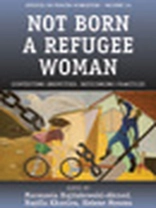Not Born a Refugee Woman is an in-depth inquiry into the identity construction of refugee women. It challenges and rethinks current identity concepts, policies, and practices in the context of a globalizing environment, and in the increasingly racialized post-September 11th context, from the perspective of refugee women. This collection brings together scholar_practitioners from across a wide range of disciplines. The authors emphasize refugee women’s agency, resilience, and creativity, in the continuum of domestic, civil, and transnational violence and conflicts, whether in flight or in resettlement, during their uprooted journey and beyond. Through the analysis of local examples and international case studies, the authors critically examine gendered and interrelated factors such as location, humanitarian aid, race, cultural norms, and current psycho-social research that affect the identity and well being of refugee women. This volume is destined to a wide audience of scholars, students, policy makers, advocates, and service providers interested in new developments and critical practices in domains related to gender and forced migrations.
Innehållsförteckning
Acknowledgements
Introduction
Maroussia Hajdukowski-Ahmed, Nazilla Khanlou and Helene Moussa
SECTION I: RECONCEPTUALIZING IDENTITIES
Chapter 1. A Dialogical Approach to Identity: Implications for Refugee Women
Maroussia Hajdukowski-Ahmed
Chapter 2. The Gender Relations of Home, Security and Transversal Feminism: Refugee Women Reclaiming their Identities
Wenona Giles
Chapter 3. Always ’Natasha’: The Transnational Sex Trafficking of Women
Victor Malarek and Sarah Wayland
Chapter 4. Reconstituting the Subject: Feminist Politics of Humanitarian Assistance
Jennyfer Hyndman and Malathi De Alwis
SECTION II: CHALLENGING METHODOLOGIES: CHALLENGING THE RESEARCHER
Chapter 5. Befriending Refugee Women: Refracted Knowledge and Shifting Viewpoints
Adrienne Chambon
Chapter 6. ’Days You Remember’: Japanese Canadian Women and The Violence of Internment
Pamela Sugiman
Chapter 7. War, Diaspora, Learning, and Women’s Standpoint
Rachel Gorman
Chapter 8. Being A Writer on Women, Violence, and War
Madeleine Gagnon
SECTION III: RETHINKING PRACTICES: CREATING SPACES FOR AGENCY
Chapter 9. The Representation of Refugee Women in our Research and Practice
Maryann Loughry
Chapter 10. Refugee Youth, Gender and Identity: On the Margins of Mental Health Promotion
Nazilla Khanlou and Sepali Guruge
Chapter 11. Pray God and Keep Walking: Religion, Gender, Identity and Refugee Women
Elzbieta Gozdziak
Chapter 12. ’We Want to Talk, They Give Us Pills’: Identity and Mental Health of Refugee Women from Sudan
Lynda Hayward, Maroussia Hajdukowski-Ahmed, Karen Trollope and Jenny Ploeg
SECTION IV: REVIEWING POLICY: TAKING RESPONSIBILITY FOR THE RIGHTS OF REFUGEE WOMEN
Chapter 13. Protecting Refugee Women: UNHCR and the Gender Equity Challenge
Judith Kumin
Chapter 14. Social Protection of Refugee Women: Paradoxes, Tensions, and Directions
Patricia M. Daenzer
Chapter 15. The Gender Factor in Refugee Determination and the Effect of ’Gender Guidelines’
Geradline Sadoway
Chapter 16. Pursuing National Responsibility in a Post 9/11 World: Seeking Asylum in Canada From Gender Persecution
Sherene Razack and Carmela Murdocca
Notes on Contributors
References
Index
Om författaren
Helene Moussa has had extensive experience as an educator, researcher, and administrator, as well as in policy and organizational development, networking, and advocacy. Her last position before her retirement was with the World Council of Churches, Geneva, Switzerland as executive secretary for uprooted people with regional responsibilities with partners in the Middle East, Asia, and the Pacific.












